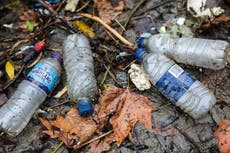1.6 billion disposable masks entered the ocean in 2020 and will take 450 years to biodegrade
Waste from throwaway masks created a mass of plastic waste around 7 per cent of the size of the Great Garbage Plastic Patch
An estimated 1.6 billion disposable masks wound up in the ocean in 2020, creating a vast pile of floating plastic waste and threatening marine life across the planet.
Researchers from Visual Capitalist found that 3 per cent of the 52 billion disposable single-use masks produced to curb the Covid-19 pandemic found their way into the sea.
The throwaway masks sent 5500 metric tonnes of plastic into the oceans, which will take up to 450 years to biodegrade, the group said.
The waste from N95 and surgical masks created a mass of plastic waste about 7 per cent of the size of the Great Pacific Garbage Patch, a huge gyre of floating debris that circulates in ocean currents.
The masks are usually made of polypropylene, which breaks up into microplastics and are then eaten by aquatic animals and birds, blocking their digestive tracts and causing their stomachs to become stuffed with plastic.
In China, an estimated 450 million disposable masks were manufactured every day during the height of the pandemic in April 2020.
The looming environmental catastrophe prompted one French ecologist to warn last year: “Soon there will be more masks than jellyfish.”
And with the Delta variant surging across all 50 US states, there is no sign that the need for masks will go away anytime soon.
This week, the Centers for Disease Control and Prevention issued new guidelines on mask wearing, advising vaccinated Americans living in areas of substantial or high Covid transmission to mask-up indoors.
Properly disposing of single-use masks in the trash or landfill is critical to minimising their impact on the ocean, experts say.
But the most effective way to reduce the impact on the ocean is to don reusable face coverings.
Join our commenting forum
Join thought-provoking conversations, follow other Independent readers and see their replies
Comments


Bookmark popover
Removed from bookmarks